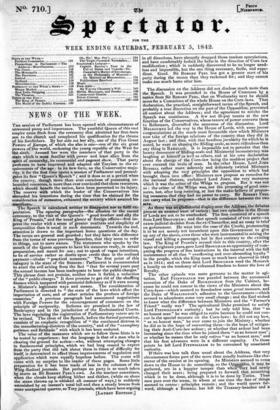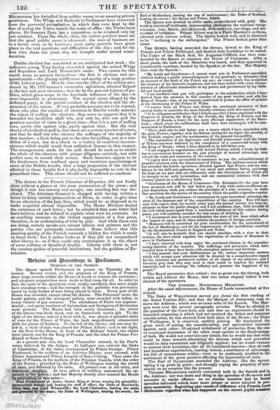The discussion on the Address did not disclose much more
than the Speech. It was preceded in the House of Commons by
notice from Sir ROBERT PEEL, that on Wednesday next he should move for a Committee of the whole House on the Corn -laws. That
declaration, the practical, straightforward terms of the Speech, and probably a true discretion on the part of the Opposition, prevented all contest about the Address; and the agreement to reecho the Speech was unanimous. A few not ill-put taunts at the new function of the Conservatives, whose tenure of power converts them to Reformers, diversified the sameness of the discussion. Lord function of the Conservatives, whose tenure of power converts them to Reformers, diversified the sameness of the discussion. Lord
MELBOURNE led the way in the House of Lords, with some jocose congratulations at the much more favourable view which Ministers now take of the foreign relations of the country than they did in August last ; and then, with that heedless jocularity for which he is noted, he went on abusing the Sliding.scale, as more ridiculous than any thing in RABELAIS. It is impossible not to perceive that the hearty denouncer of Sliding-scale and Ministerial inconsistency was laughing at himself as well as others, and at his own declaration about the change of the Corn-law being the maddest project that ever entered the brain of man. In the other House, Lord JOHN RUSSELL rather more solemnly and delicately twitted Ministers with adopting the very principles the opposition to which had brought them into office : Ministers now propose as remedies for the national distress, exclaimed Lord Jonx, the very measures which it was the crime of the Whigs to propose. But it was not so : the crime of the Whigs was, not the proposing of good tnea- sures, but, after long resisting, at last the make-believe of propos- ing measures that they had no power to carry. Sir ROBERT PEEL can carry what he proposes—that is the difference between the two sets.
As there-WS-8no gladiatorial display over the Address, the debates present an unusual want of variety; but two episoCles in the House of Lords are not to be overlooked. The first consisted of a speech from Lord BROUGHAM ; and that speech consisted of two parts—an extra-judicial decision from the ex-Chancellor, and an essay in brief on government. He went into the case of the Creole, pronouncing it to be not merely not incumbent upon this Government to give up any of the slaves, even those who were instrumental in seizing the vessel and killing a passenger, but in fact contrary to the existing law. The King of Prussia's second visit to this country, after the lapse of eighteen years, gave Lord BROUGHAM an opportunity of com- paring the progress of free institutions in the interval with the full maintenance of all that "overflowing and over-abounding loyalty" in the people, which the King must as much have observed in 1842 as in 1814; and on those data Lord BROUGHAM read the Monarch a homily on the tendency of enhanced freedom to foster the love of Royalty. The other episode was more germane to the matter in agi- tation. Earl Ferzwu..t.tAss was puzzled between the announced secession of the Duke of BUCKINGHAM from the Cabinet, be- cause he could not concur in the views of the Ministers about the Corn-laws—which seemed to foreshadow some great measure, and the Duke of WELLINGTON'S adhesion to the Government—which seemed to adumbrate some very small change ; and the Earl wished to know what the difference between Ministers and the "Farmer's Friend" really was ? The agricultural Duke promised to satisfy Lord FITZWILLIAM'S curiosity; but he only told him, that "as an honest man" he was obliged to retire because he could not con- cur in the special measure on the Corn-laws : be did not say bow, "as an honest man," he ever came to join the Ministry ; whether he did so in the hope of converting them—in the hope of mitigat- ing their Anti-Corn-law ardour ; or whether that ardour had been increasing since the tune when he joined them "as an honest man"; or whether he means that he only retires "as an honest man," and that his first advances were in a different capacity. On these points he left Lord FITZWILLIAId to be consumed by unsatiated curiosity. If there was less talk than usual about the Address, that very circumstance forms part of the more than usually business-like cha- racter of the session at its opening. As Ministers seemed to come down to the House to do something, so the Opoifition, it may be gathered,, are in a happier temper than wheiniey had newly changed their Beats; being prepared to forward that something which is to be done, although it is to be done by Tories. Thus men pass over the scene, in whom at one time the fate of things seemed to centre : principles remain ; and the world moves for- ward, although a Roams. has left the Treasury-benches and a MELBOURNE has dwindled from arbiter rerum to an amusing private gentleman. The Whigs and Radicals in Parliament have recovered from the perennial perturbation in which they were kept by the fear of seeing the Tories invade the seats of office : the Tories have places, Sir ROBERT PEEL has a reputation, to be retained only by Just conduct. Upon the whole, then, the veriest partisan must see that the good public cause is advanced; the men of business are in a better state to do business ; mere party quarrels have given place to the real questions and difficulties of the day ; and for the first time these ten years they are brought under actual consi- deration.



























